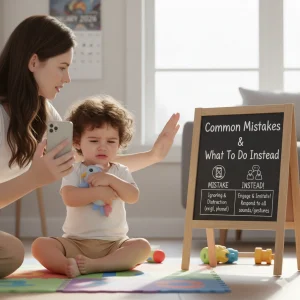Stuttering: Is It an Intellectual Disability?
Last Updated: June 11, 2025
Stuttering is a speech disorder that affects millions of people worldwide. For many, it can be a significant challenge, impacting daily communication and social interactions. However, there is a common misconception that stuttering is linked to intellectual disabilities. This misunderstanding can lead to stigma and unnecessary barriers for those who stutter. People often wonder, “Is stuttering an intellectual disability?” The purpose of this article is to address this question and provide accurate information about the nature of stuttering. We will explore what stuttering really is, debunk myths, and clarify its relationship with intellectual abilities.
Improve Your Speech Online
Overcome speech challenges and build your voice with expert online therapy. Regain clarity, fluency, and communication strength.
Understanding Stuttering
Stuttering is a communication disorder that affects the flow of speech. People who stutter know what they want to say but have difficulty saying it due to involuntary repetitions, prolongations, or blocks of sounds, syllables, or words. This can make speaking a frustrating and challenging experience.

Symptoms of Stuttering
Stuttering symptoms vary from person to person and can change over time. Common symptoms include:
- Repetitions: Repeating sounds, syllables, or words (e.g., “W-W-W-What time is it?”)
- Prolongations: Prolonging sounds within a word (e.g., “Ssssssee you later.”)
- Blocks: Pauses or blocks in speech where no sound comes out despite the effort to speak.
Stuttering as a Speech Disorder
It’s essential to understand that stuttering is primarily a speech disorder, not a cognitive or intellectual disability. People who stutter typically have normal intelligence and cognitive functions. The speech difficulties they experience are related to the physical process of speaking, not to their mental capabilities.
This distinction is crucial because it helps to combat the stigma and misconceptions that often surround stuttering. Recognizing that stuttering does not equate to lower intelligence allows for more accurate support and understanding for those who stutter.
Also Read: What is the Relation between Communication, Speech and Language? | Speech and Language Therapy
Stuttering and Intellectual Disability: Clearing the Confusion
When discussing stuttering, it’s important to clarify that stuttering and intellectual disabilities are entirely different conditions. Stuttering is a speech disorder that affects the fluency of speech, while intellectual disabilities involve limitations in intellectual functioning and adaptive behavior.
Differences Between Stuttering and Intellectual Disabilities
- Nature of the Condition: Stuttering impacts speech production, causing disruptions in the flow of speaking. In contrast, intellectual disabilities affect cognitive functions such as learning, reasoning, and problem-solving.
- Impact on Abilities: Stuttering does not impact a person’s intellectual capabilities. Individuals who stutter can have the same range of intellectual abilities as those who do not stutter.
- Causes: The causes of stuttering are believed to be a combination of genetic, neurological, and environmental factors. Intellectual disabilities, however, can result from a variety of causes, including genetic conditions, developmental disorders, and brain injuries.
Examples of Stuttering Not Impacting Intellectual Abilities
Many individuals who stutter are highly intelligent and have achieved remarkable success in various fields. Here are a few examples:
- Joe Biden: The President of the United States, Joe Biden, has openly discussed his experiences with stuttering. Despite this speech disorder, he has had a long and successful political career.
- James Earl Jones: The iconic voice of Darth Vader in “Star Wars” and Mufasa in “The Lion King,” James Earl Jones struggled with stuttering during his childhood. His achievements in acting and voice work highlight that stuttering does not hinder intellectual or creative capabilities.
- Emily Blunt: An acclaimed actress known for her roles in films such as “The Devil Wears Prada” and “Mary Poppins Returns,” Emily Blunt has shared her journey of overcoming stuttering. Her career success underscores that stuttering does not limit one’s potential.
Comparison of Stuttering and Intellectual Disabilities
| Aspect | Stuttering | Intellectual Disabilities |
|---|---|---|
| Definition | A speech disorder that affects the flow and fluency of speech. | Cognitive impairments that affect learning, reasoning, and problem-solving abilities. |
| Symptoms | – Repetitions of sounds, syllables, or words – Prolongations of sounds – Blocks where no sound is produced – Physical signs like eye blinks or facial tension | – Varies widely – Difficulties in intellectual functioning (e.g., reasoning, problem-solving) – Challenges in adaptive behavior (e.g., social and practical skills) |
| Impact on Intelligence | Stuttering does not affect intellectual abilities. | Intellectual disabilities involve significant limitations in intellectual functioning. |
| Primary Treatment | Speech therapy, which focuses on improving speech fluency and communication skills. | Educational and behavioral interventions designed to improve cognitive function and adaptive behavior. |
Know more: Speech Sound Disorders: Causes, Treatment and Strategies
Medical and Professional Views
Insights from Speech-Language Pathologists and Other Professionals
Speech-language pathologists (SLPs) and other professionals who work with individuals who stutter offer invaluable insights into the nature of stuttering and its impact on daily life. According to SLPs, stuttering is a complex speech disorder that involves disruptions in the normal flow of speech. These disruptions can include repetitions of sounds, syllables, or words, prolongations of sounds, and blocks of speech where no sound is produced.
SLPs emphasize that stuttering is not indicative of cognitive or intellectual disabilities. People who stutter typically have normal intellectual capabilities. This distinction is crucial for understanding and supporting individuals who stutter effectively.
Medical Coding Errors and Misdiagnosis
Medical coding errors can lead to significant misdiagnoses. For instance, when a resident mistakenly coded stuttering as an “intellectual disability,” it caused emotional distress and practical challenges for the individual involved. Such errors stem from a lack of proper training and awareness about stuttering among medical professionals.
Misdiagnosis can have serious implications, including inappropriate treatment plans and social stigma. Therefore, accurate diagnosis and coding are essential for providing the right support and avoiding unnecessary confusion.
The Importance of Proper Training and Awareness
Proper training and awareness among medical professionals are vital to ensure that stuttering is accurately identified and treated. Here are some key points to consider:
- Education and Training: Medical professionals, including doctors, nurses, and residents, should receive comprehensive training on stuttering and other speech disorders. This includes understanding the symptoms, impacts, and appropriate coding practices.
- Awareness Campaigns: Awareness campaigns can help reduce stigma and promote a better understanding of stuttering. These campaigns can be conducted within healthcare institutions and the broader community.
- Interdisciplinary Collaboration: Collaboration between SLPs and other healthcare providers can lead to more accurate diagnoses and better support for individuals who stutter. Regular consultations and case discussions can enhance understanding and treatment approaches.
Moving Towards Acceptance and Understanding
Encouraging Inclusivity and Understanding
Creating an inclusive and understanding environment for those who stutter starts with awareness and empathy. As we’ve discussed, stuttering is a speech disorder, not an intellectual disability. It’s essential to recognize this and treat individuals who stutter with the same respect and consideration as anyone else.
To foster inclusivity, consider these steps:
- Listen Patiently: Allow individuals who stutter the time they need to express themselves. Avoid interrupting or finishing their sentences for them.
- Show Respect: Maintain eye contact and focus on what the person is saying, not how they are saying it. This helps to normalize their speech and reduces anxiety.
- Educate Yourself and Others: Share accurate information about stuttering with friends, family, and colleagues. Dispelling myths and misconceptions can significantly reduce stigma and promote understanding.
The Importance of Patience, Respect, and Support
Patience and respect are crucial when interacting with someone who stutters. Understand that stuttering can be frustrating and stressful for the individual. By showing patience and offering support, you can help create a more comfortable and less pressurized environment.
Support can come in various forms:
- Emotional Support: Encourage open conversations about stuttering and its challenges. Offer a listening ear and empathetic responses.
- Practical Support: If you’re in a position to do so, advocate for accommodations in the workplace or educational settings that can help individuals who stutter communicate more effectively.
Wellness Hub: Supporting Individuals Who Stutter
At Wellness Hub, we are dedicated to providing resources and support for individuals who stutter and their families. Our goal is to create a community where everyone feels understood and valued, regardless of their speech patterns.
Wellness Hub offers various services, including:
- Speech Therapy: Personalized therapy sessions to help individuals manage stuttering and improve their communication skills.
- Educational Resources: Access to articles and videos that provide valuable information about stuttering and effective coping strategies.
Conclusion
Stuttering is a speech disorder that affects the flow of speech but does not impact a person’s intellectual abilities. It is important to understand this difference to create a more inclusive and supportive environment. By knowing that stuttering is not an intellectual disability, we can reduce stigma and provide the right support for those who stutter.
Accurate understanding and proper diagnosis are essential. Misconceptions and medical coding errors can lead to emotional and social challenges for individuals who stutter. By promoting education and awareness, we can help create a world where people who stutter are respected and understood. At Wellness Hub, we offer resources and support for individuals who stutter and their families. Visit our Wellness Hub Resources to learn more about how we can support you. Together, we can make a difference by promoting acceptance, understanding, and support for everyone.
Frequently Asked Questions
1. Is stuttering considered an intellectual disability?
No, stuttering is not considered an intellectual disability. It is a speech disorder that affects the flow of speech, but it does not impact a person’s intellectual abilities.
2. What causes stuttering?
Stuttering is believed to be caused by a combination of genetic, neurological, and environmental factors. It is a complex speech disorder with no single cause.
3. How does stuttering affect daily life?
Stuttering can impact daily life by making communication more challenging. This can affect social interactions, educational opportunities, and professional settings. However, with proper support and therapy, individuals who stutter can lead successful and fulfilling lives.
4. Can stuttering be cured?
There is no cure for stuttering, but various treatments and therapies can help manage and reduce the severity of stuttering. Speech therapy is the most common and effective treatment.
5. How is stuttering diagnosed?
Stuttering is diagnosed through a comprehensive evaluation by a speech-language pathologist. The evaluation includes assessing speech patterns, medical history, and the impact of stuttering on daily activities.
6. Are there famous people who stutter?
Yes, many famous people have stuttered, including President Joe Biden, actor James Earl Jones, and actress Emily Blunt. Their success demonstrates that stuttering does not limit intellectual or professional achievements.
7. How can I support someone who stutters?
Support someone who stutters by being patient, maintaining eye contact, and allowing them time to speak without interruption. Educating yourself and others about stuttering can also help reduce stigma and promote understanding.
8. What legal protections exist for people who stutter?
Under the Americans with Disabilities Act (ADA), stuttering can be considered a disability if it substantially limits one or more major life activities. This provides legal protection against discrimination and ensures reasonable accommodations in various settings.
9. Can children outgrow stuttering?
Some children may outgrow stuttering, especially with early intervention and therapy. However, for others, stuttering may continue into adulthood. Early assessment and support are crucial.
10. Where can I find resources and support for stuttering?
Wellness Hub offers a variety of resources and support for individuals who stutter and their families. Visit our Wellness Hub Resources to learn more about available programs and services.
About the Author:
Anuradha Karanam
Speech-language pathologist (7+ years of experience)
Anuradha Karanam is a skilled speech-language pathologist with over 6 years of experience. Fluent in Tamil, Telugu, Hindi, and English, she specializes in parent counseling, speech sound disorders, fluency assessment, and speech-language evaluations. Anuradha excels at working with children with developmental disorders, offering creative and effective therapy programs. Currently, at Wellness Hub, she holds a BASLP degree and is registered with the RCI (CRR No A85500). Her patience, ambition, and dedication make her a trusted expert in her field.
Connect with Anuradha to learn more about how she can help you or your loved one find their voice.
Book your Free Consultation Today
Parent/Caregiver Info:
Client’s Details:
* Error Message








